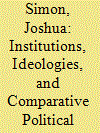|
|
|
Sort Order |
|
|
|
Items / Page
|
|
|
|
|
|
|
| Srl | Item |
| 1 |
ID:
136697


|
|
|
|
|
| Summary/Abstract |
The disparities in per-capita wealth and national productivity that divide the United States and Latin America today have often been understood as results of institutional variations introduced during each region's period of imperial rule. According to this interpretation, path-dependent processes preserved institutions installed by Britain, Spain, and Portugal across the centuries, propagating their positive or negative economic effects, and eventually producing a marked “development gap” in the hemisphere. This article aims to improve this account by highlighting the direct and indirect economic effects of the success or failure of the political unions established after independence in both the United States and Latin America. It demonstrates that influential political theorists throughout the hemisphere understood the developmental advantages to be gained from unifying former colonies and employing the political authority newly at their disposal to abolish the stifling institutional legacies of European rule, suggesting that if Spanish America's unions had endured, or conversely, if the United States had collapsed, the two regions' economies might not have diverged as dramatically as they subsequently did. This illustrates an important contribution that the emerging subfield of “comparative political theory” can make to comparative political science in general, and to the new institutionalism in particular, by providing uniquely direct insight into the choices available to political actors in consequential moments of institutional genesis and change, and revealing the contingency of institutional variations that might otherwise appear inevitable.
|
|
|
|
|
|
|
|
|
|
|
|
|
|
|
|
| 2 |
ID:
172885


|
|
|
|
|
| Summary/Abstract |
The growing prominence of comparative political theory has inspired extensive and fruitful methodological reflection, raising important questions about the procedures that political theorists should apply when they select texts for study, interpret their passages, and assess their arguments. But, notably, comparative political theorists have mainly rejected the comparative methods used in the subfield of comparative politics, because they argue that applying the comparative method would compromise both the interpretive and the critical projects that comparative political theory should pursue. In this article, I describe a comparative approach for the study of political ideas that offers unique insight into how the intellectual and institutional contexts that political thinkers occupy influence their ideas. By systematically describing how political thinking varies across time and over space in relation to the contexts within which political thinkers live and work, the comparative method can serve as the foundation for both deconstructive critiques, which reveal the partial interests that political ideas presented as universally advantageous actually serve, and reconstructive critiques, which identify particular thinkers or traditions of political thought that, because of the contexts in which they developed, offer compelling critical perspectives on existing political institutions.
|
|
|
|
|
|
|
|
|
|
|
|
|
|
|
|
|
|
|
|
|